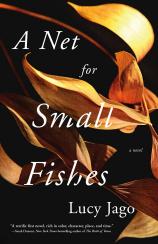A Net for Small Fishes
Review
A Net for Small Fishes
As I’m sure I’ve written here previously, I don’t naturally gravitate toward historical fiction. But when I pick up a particularly stellar example of the genre, I find myself immersed in the imaginative world the author has constructed from their research. That’s exactly how I felt as Lucy Jago drew me into the world of the Jacobean court in her latest novel, A NET FOR SMALL FISHES.
Jago, a former documentary film producer who previously wrote an award-winning biography, THE NORTHERN LIGHTS, clearly has done her background research here. As she reveals in her Author’s Note, virtually every character in the book is based on a real-life historical figure, verified in the historical record. But of course, especially since Jago’s real topic of concern is the lives of the women of the court, she also must use her powers of imagination to fill in the gaps in that historical record.
"[T]his well-wrought work of historical fiction...will have readers thinking about the 17th century in a whole new light."
At the center of the book is Anne Turner, the wife of a physician to the royal court, the mother of six children, and the holder of a patent for yellow starch, which might not sound that impressive to the 21st-century reader, but apparently was quite enticing to the fashion-conscious members of King James I’s court. Among them is Frances Howard, the beautiful young Countess of Essex, who has been married to her extremely unpleasant husband for several months but has yet to consummate the marriage. It’s not for lack of trying, as it turns out; it’s just that the Earl of Essex seems unable to perform. His impotence only escalates (as it were), along with his frustration at the situation and his anger at his wife’s supposed insubordination and flirtatious behavior.
The novel stretches over a span of several years, from 1609 to 1613 (with a brief epilogue in 1650). During that time, Anne and Frances (Frankie) grow increasingly close, supporting each other through all manner of losses and violations. Once Frankie identifies a means to free herself from her stifling marriage, they join together on a plot that might be their downfall.
Throughout, Jago prompts readers’ consideration of many issues, from the role of religion to the ways women inevitably have found to subvert patriarchal systems of control. But her most sustained inquiry is about the issue of class, and whether Anne and Frankie can ever truly be peers and confidantes when they come from such different stations in life, a fact that grows ever more stark as the events of the novel unfold.
Anne is loyal to a fault, but can the same be said for Frankie? That’s a question that will be considered and discussed at the conclusion of this well-wrought work of historical fiction, which will have readers thinking about the 17th century in a whole new light.
Reviewed by Norah Piehl on December 3, 2021
A Net for Small Fishes
- Publication Date: November 8, 2022
- Genres: Fiction, Historical Fiction, Women's Fiction
- Paperback: 352 pages
- Publisher: Flatiron Books
- ISBN-10: 1250261961
- ISBN-13: 9781250261960




